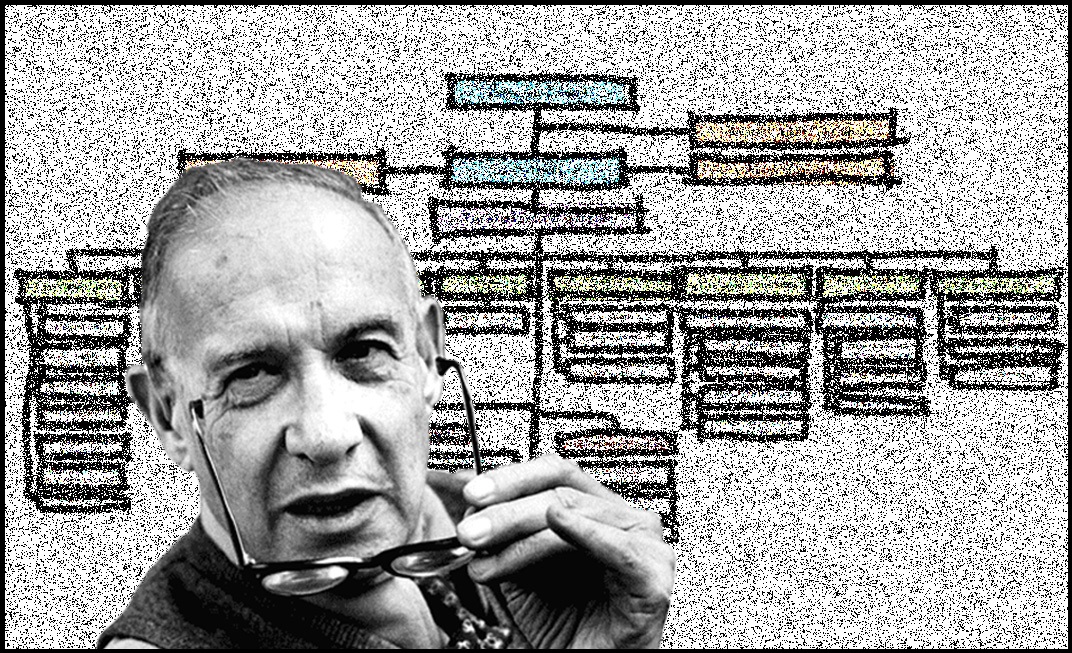Peter Drucker is een managementgoeroe. In “The Daily Drucker” zijn stukken tekst opgenomen uit zijn vele boeken. Een beeld dat bij mij blijft hangen, is dat Drucker vooral een goeroe is vanuit het traditionele hiërarchische perspectief. Hij doet ook nogal wat stellige uitspraken die binnen een traditionele hiërarchie al enigszins aanvechtbaar zijn, maar die bij zelfsturing hun logica totaal verliezen.
Lees bijvoorbeeld de vijf basisactiviteiten van managers. Kijk naar iedere activiteit. Waarom zouden deze activiteiten niet door gelijkwaardige medewerkers verricht kunnen worden? Sommige van deze activiteiten kunnen zelfs beter door een collega worden uitgevoerd dan door een manager. En, welke manager kan al deze dingen allemaal goed uitvoeren? En dat terwijl de kans dat de vereiste kwaliteiten hiervoor binnen een groep aanwezig zijn, verdeeld over verschillende individuen, statistische gezien toch groter moet zijn, dan dat die manager ze allemaal in zich verenigt?
There are five basic operations in the work of the manager.
- Managers, in the first place, set objectives. They determine what the objectives should be. They determine what the goals in each area of objectives should be. They decide what has to be done to reach these objectives. They make the objectives effective by communicating them to the people whose performance is needed to attain them.
- Second, managers organize. They analyze the activities, decisions, and relations needed. They classify the work. They divide it into manageable activities and further divide the activities into manageable jobs. They group these units and jobs into an organization structure. They select people for the management of these units and for the jobs to be done.
- Next, managers motivate and communicate. They make a team out of the people who are responsible for various jobs.
- The fourth basic element in the work of the manager is measurement. The manager establishes yardsticks—and few factors are as important to the performance of the organization and of every person in it.
- Finally, managers develop people, including themselves.
Ook is Drucker nogal strikt over besluitvorming.
Someone in the organization must have the authority to make the final decision in a given area. It also is a sound principle that authority be commensurate with responsibility. It is a sound principle that any one person in an organization should have only one “master.”
Ik “verdenk” Peter Drucker er hier van dat hij bedoelt dat die ‘master’ een manager moet zijn, ergens in een hiërarchische structuur. Maar, dat is helemaal niet nodig. Bij zelfsturing, of gedecentraliseerd samenwerken, kunnen ook de beslissingen gedistribueerd worden. En als meerdere mensen een rol vervullen (zoals bijvoorbeeld binnen holacracy regelmatig het geval is), waarom zouden die dan niet gezamenlijk tot een besluit kunnen komen? In de praktijk gebeurt dat regelmatig.
Hierna nog een stellig stuk tekst.
“What activities belong together and what activities belong apart?” A searching analysis is needed that groups activities by the kind of contribution they make. There are four major groups of activities, if distinguished by their contribution. First, result-producing activities—that is, activities that produce measurable results that can be related, directly or indirectly, to the results and performance of the entire enterprise. Second, support activities that, while needed and even essential, do not by themselves produce results but have results only through the use made of their “output” by other components within the business. Third, activities that have no direct or indirect relationship to the results of the business, activities that are truly ancillary. They are hygiene and housekeeping activities. Finally, is the top-management activity. Among the result-producing activities, there are some that directly bring in revenues (or in service institutions, directly produce “patient care” or “learning”). Here belong innovating activities, selling and all the work needed to do a systematic and organized selling job. Here also belongs the treasury function, that is, the supply and management of money in the business.
Key activities should never be subordinated to nonkey activities. Revenue-producing activities should never be subordinated to nonrevenue-producing activities. And support activities should never be mixed with revenue-producing and result-contributory activities.
Ook hier geldt weer, misschien een nuttig advies voor traditionele organisaties. Al lijkt ook dat mij aanvechtbaar. Maar bij zelfsturing, neem holacracy, kan één persoon gemakkelijk meerdere rollen uit verschillende van de bovengenoemde categorieën combineren. Daar is niks op tegen. Sterker, nog het is leuk voor de mensen dat dit kan. En het kan verrijkend werken, omdat mensen de gelegenheid krijgen andere kwaliteiten dan hun primaire te proeven, tonen of ontwikkelen.
Nee, ik heb niet al zijn boeken gelezen, maar uit de citaten in “The Daily Drucker”, lijkt Drucker mij geen goeroe op het gebied van zelfsturing/gedecentraliseerd samenwerken.
Citaten uit “The Daily Drucker”.

